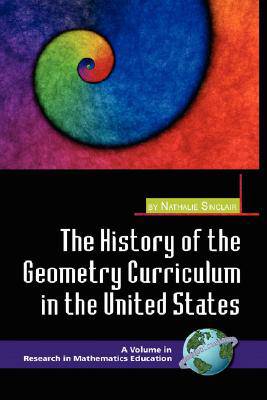
- Retrait gratuit dans votre magasin Club
- 7.000.000 titres dans notre catalogue
- Payer en toute sécurité
- Toujours un magasin près de chez vous
- Retrait gratuit dans votre magasin Club
- 7.000.0000 titres dans notre catalogue
- Payer en toute sécurité
- Toujours un magasin près de chez vous
The History of the Geometry Curriculum in the United States (Hc)
Nathalie Sinclair
152,45 €
+ 304 points
Description
A volume in Research in Mathematics Education Series Editor Barbara J. Dougherty, University of Mississippi This volume investigates the evolution of the geometry curriculum in the United States over the past 150 years. A primary goal is to increase awareness of the nature of the current geometry curriculum by investigating the historical, mathematical and pedagogical influences that it has sustained since its inception. Given the limited access to first-hand accounts of the enacted geometry curriculum during the past 150 years, the book relies on textbooks to provide a record of the implemented curriculum at any given point in time and on policy documents and journal articles to provide insight into the prevalent issues and arguments of the day. The book is organized in a chronological sequence of "notable events" leading to discernable changes in thinking about the geometry curriculum over the past century and a half-roughly the extent of time during which geometry has been taught in American schools. Notable events include important reports or commissions, influential texts, new schools of thought, and developments in learning technologies. These events affected, among other things: content and aims of the geometry curriculum; the nature of mathematical activity as construed by both mathematicians and mathematics educators; and, the resources students are given for engaging in mathematical activity. Before embarking through the notable events, it is necessary to consider the "big bang" of geometry, namely the moment in time that shaped the future life of the geometry curriculum. This corresponds to the emergence of Euclidean geometry. Given its influence on the shape of the geometry curriculum, familiarity with the nature of the geometry articulated in Euclid's Elements is essential to understanding the many tensions that surround the school geometry curriculum. Several themes emerge over the course of the monograph, and include: the aims and means of the geometry curriculum, the importance of proof in geometry, the role of visualization and tactile experiences, the fusion between solid and plane geometry, the curricular connections between geometry and algebra, and the use of motion and continuity. The intended audience would include curriculum developers, researchers, teachers, and curriculum supervisors.
Spécifications
Parties prenantes
- Auteur(s) :
- Editeur:
Contenu
- Nombre de pages :
- 116
- Langue:
- Anglais
- Collection :
Caractéristiques
- EAN:
- 9781593116972
- Date de parution :
- 29-01-08
- Format:
- Livre relié
- Format numérique:
- Genaaid
- Dimensions :
- 156 mm x 234 mm
- Poids :
- 340 g

Les avis
Nous publions uniquement les avis qui respectent les conditions requises. Consultez nos conditions pour les avis.






